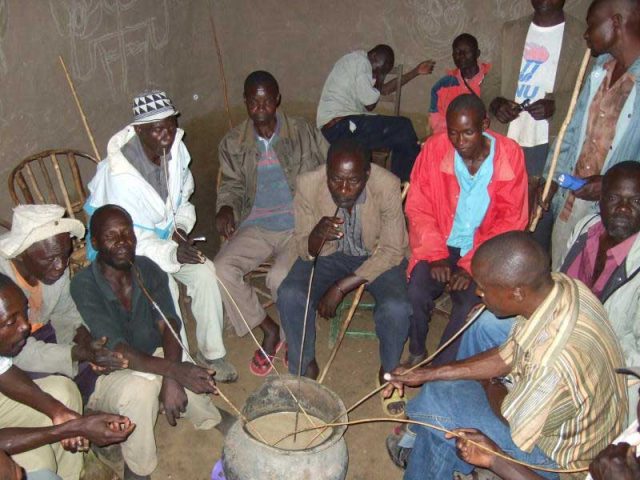
The Luhya people in Kenya pride themselves in their traditional brew popularly known as Busaa that has been in existence since time immemorial. Traditional ceremonies like circumcision, Barazas, funerals, weddings, family gathering are incomplete without pots of Busaa sitting among elderly men who often sip away the contents as they get lost in the conversation of their youthful days reminiscing their mischief and tragedies.
Brewing Busaa is a thriving business in the heart of villages and slums, profitable enough to put Mama Pima’s children through high school and university altogether. Proprietors of such businesses never lack because villages and slums are a hotbed of alcoholics who drink their arses out from sunrise to sunset.
What is so special about Busaa, that lovers of this traditional brews cannot do without? It must be is contents and how it is prepared and the manner in which it is consumed by locals. For the record, Busaa is very legal in Kenya. It just needs to be licensed and given KEBS approval then sold in glass bottles of not less than 250ml.
Here is a step by step by step guide to brewing Busaa and other interesting factors related to it.
Ingredients
Busaa is a cereals based fermented beer typically made from the most abundant source of grains commonly maize, millet or sorghum in Kenya. Apart from Luhyas, Kisiis Luo and Kuria also brewing this alcoholic beverage. It is prepared in huge drums, whose contents must be emptied and the drums cleaned thoroughly for hygiene purposes before the brewing process starts off.
Brewing process
Stage One: The cereal commonly maize grains are converted into flour which is mixed with water then left to ferment for two to three days in big drums depending on the occasion. Afterward, the contents of the fermentation process are roasted.
Stage Two: The roasted content which is fermented maize flour is mixed with water for the second time and finely grounded malt (a grain that has been steeped, germinated, and dried, used for distilling or brewing) made form millet added to it. The mixture is left to ferment for another two to three days.
While the product is not exactly a fine beverage yet, the coarse particles of the mixture are then filtered by squeezing through a cloth sack to produce the stronger busaa. Adding hot water to the mixture and then filtering again produces the weaker busaa. Since Busaa has a short life, after the straining the brew, the content is now ready for consumption and is transferred from the drum into the five or ten-liter containers from which the customers can be easily served from.
Pricing per cup
Folks start trickling in from as early as 6 am into Busaa dens, but with the stringent laws in place, these dens officially opened at 2 pm. All to often women are tasked with serving and collecting cash from the customers. A cup of Busaa goes for as little as Ksh 10, for a regular customer he may end up spending as much as Ksh 500 in an evening, ordering more cups for friends who join in later.
Some customers prefer the drink with no husks so the waiters will have to sieve the brew one more time before serving. The sieved drink is warmed in boiling water and served hot to the customer.
Health benefits
The alcoholic aspect of Busaa comes from the ethanol concentration which is estimated to be at 22.9 ml in a standard drink. This means that a few cups of Busaa could knock the man out of you if you happen to be a lightweight. A glass a week ain’t that bad for a novice.
But just so you know, Busaa is a source of calcium which helps in strengthening your bones and it plays a key role in digestion, temporarily relieving stress and reducing high blood pressure and improving blood circulation by cleaning body tissues.
However, the addiction, a bunch of chronic diseases that come with its regular consumption, and financial constraints outweigh the good.
Law requirements
All too often police raid these Busaa dens, ransack the whole compound and destroy thousand of shilling worth of Busaa. But on a lucky day when a bad cop shows up, they serve them free Busaa and they walk away, so the business lives to see another day. However, Busaa is limited to adults only.
According to the Alcoholic Drinks Control Act anybody who sells alcohol to minors risks a jail term of one year or a fine of Ksh 150, 000 or both. For the wicked ones that lace Busaa with the poisonous substance or sell contaminated Busaa risk five years in jail or a fine of Ksh 5 million or both.
